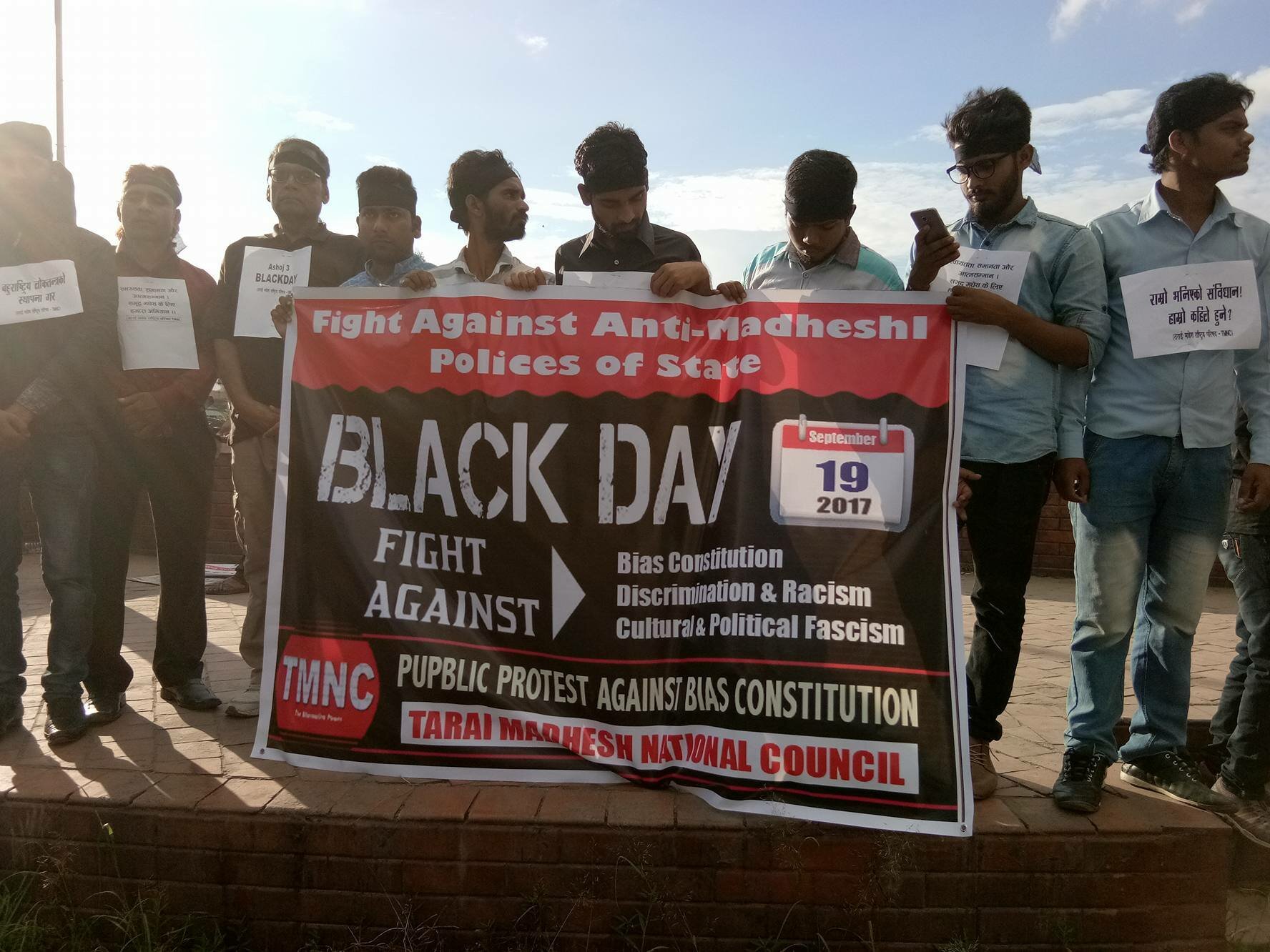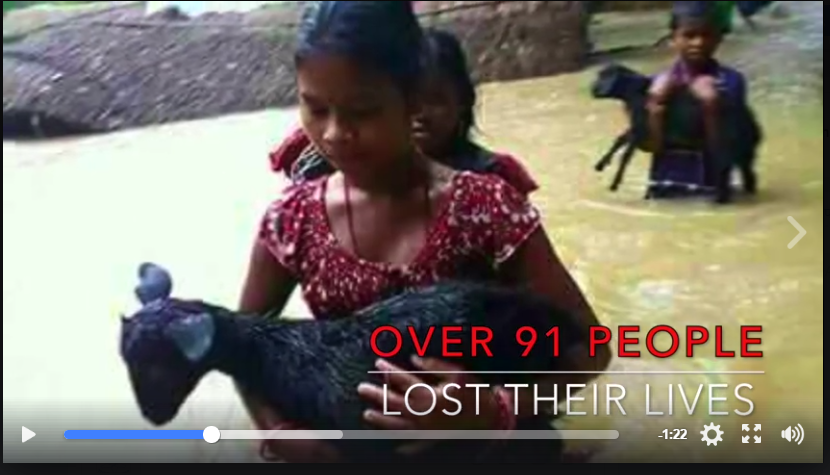Resistance over Nepal Constitution Continues
September 19, 2017
Today the government of Nepal observes the second anniversary of the constitution promulgation. But the resistance by discontented communities, especially by Madhesis, over the constitution continues.
Two years ago, Nepal promulgated ‘The Constitution of Nepal 2015’ in September 2015. On the the constitution promulgation day, Shatrudhan Patel, one of the demonstrators in Birgunj[1] was killed in police firing when thousands of demonstrators defying curfew order took to streets in the city to protest the new constitution. Over 60 people were killed in the country when security forces used force to crackdown the 2015/16 constitution-related protests that lasted for more than five months.
The anti-constitution const-related protests had started since the government adopted ‘fast-track method’ to forcibly promulgate the constitution without taking due process into account under the pretext of expediting post-earthquake response, and continued on the day of the constitution promulgation and thereafter. The resistance still continues.
For the last two years – 2015 and 2016, Madhes-based political parties had observed The Black Day on The Constitution Day. But this year they made no announcement to continue the observation of Black Day after their participation in local body elections. With the failure of constitution amendment bills, Rastriya Janata Party Nepal (RJPN), the alliance of six different Madhes-based parties which led protests against the constitution, participated in the local body elections for the third phase held on 18 September 2017. RJP had boycotted the elections for the first and second phases held in 14 May and 28 June 2017 while other two Madhesi parties — Federal Socialist Forum Nepal (FSFN) led by Upendra Yadav and National Democratic Party led by Bijay Gachhedar — participated in those elections without getting the constitution amended.
However, youths in Madhes were not happy with RJPN’s decision to take part in the elections without the constitution amendment. On The Constitution Day, a youth association — Terai Madhes National Council (TMNC)– is observing the Black Day to protest the constitution, according to the press statement issued by TMNC[2] on September 18. TMNC, as per the press statement, is a volunteer missionary association of politically aware and empowered youths which aims to resolve social and political issues through different campaigns. Through the press statement, the youths demanded the amendment of the constitution.
Those killed in anti-constitution protests awaits justice
While the protests over the constitution was still on, Human Rights Watch (HRW) on 16 October 2015 published a comprehensive report [3]that includes the documentation of the killings of 25 people, including 9 police officers and 16 members of the public, in five Terai districts between 24 August and 11 September 2015. HRW had found no evidence that any of these victims, including the police, was posing a threat to another at the time they were killed.
Issuing a statement on 23 September 2015, the United Nations Office of the High Commissioner for Human Rights (UN OHCHR) had expressed serious concerns over the deteriorating human rights situation in Terai due to the state’s response to anti-constitution protests[4]. The OHCHR had called the government for an independent investigations into the protest-related killings.
Likewise, on 23 May 2016, Human Rights Commission (AHRC) and Tarai Human Rights Defenders Alliance (‘THRD Alliance’) jointly released a Special Report “Protest and Repression – State Responsibility for 37 Killings During Protests in Terai”[5]. The report focused on the anti-constitution protests from 16 August 2015 to 5 February 2016 in which over 40 people died as of that time. The joint human rights monitoring and investigation of the two rights bodies concluded that the security forces engaged in a consistent pattern of excessive use of force, resulting in the deaths of 34 people and three others died in situations where the police could have intervened to stop their killing by counter-protesters.
Similar was the findings of the report of National Human Rights Commission (NHRC). On March 16, 2016, NHRC also raised the issue of excessive use of force by security personnel in the anti-constitution protests in Terai during the United Nations Universal Periodic Review and requesting the government of Nepal for investigation into those killings[6].
However, the government of Nepal has made no response to any suggestions given by human rights organizations including NHRC’s directions to immediately investigate and prosecute those responsible for the killings resulted in excessive use of force by security personnel.
With the mandate to investigate the aforesaid incidents, a High-Level Inquiry Commission was formed in October 2016. After the commission’s six-month mandate ended in April 2017, it was renewed for three months until October 2017.
THRD Alliance is engaged with the High-Level Inquiry Commission since its formation, and once its report is submitted it urges the government to fully implement the suggestions and recommendations of the commision. This will contribute to fight against the deep-rooted problem of impunity in Nepal. To this date, the government of Nepal has taken no action against any member of the security forces responsible for these serious human rights violations in Tarai.
On 7 June 2017, the government of Nepal has received a joint communication sent by the Special Rapporteur on extrajudicial, summary or arbitrary executions; the Special Rapporteur on the promotion and protection of the right to freedom of opinion and expression; the Special Rapporteur on the rights to freedom of peaceful assembly and of association; and the Special Rapporteur on minority issues. This joint communication from the Special Procedures was concerning several incidents of alleged extrajudicial executions and excessive use of force by Nepalese security officers between 2013 and 2017, including during demonstrations held by ethnic minority groups, which resulted in over 40 persons killed and several others injured, in Nepal’s Terai region.
But, as per our information, the government of Nepal has not furnished answers to the aforesaid joint communication within the given two months, which ended on 7 August 2017. THRD Alliance would like to urge the government of Nepal to respond to the joint communication from Special Procedures. This level of neglect by the government of Nepal raise doubts on the effective implementation of the court verdicts and investigation of Terai killings in anti-constitution protests, and other human rights violations.
THRD Alliance, on the second anniversary of the constitution promulgation, would like to urge the government to ensure the meaningful amendment of the constitution to meet the aspirations of discontented groups for ending the ongoing resistance over the constitution and sustainable peace in the country.
[1] The Himalayan Times (Sep 20, 2015) Protester killed in police firing https://thehimalayantimes.com/nepal/protester-killed-in-police-firing-2/
[2] Madhesi Youth (Sep 18, 2017) Madhes to observe Black Day on The Constitution Day on Sep 19: TMNC http://www.madhesiyouth.com/news/madhes-observes-black-day-constitution-day-sep-19/
[3] Human Rights Watch (Oct 16, 2015) “Like We Are Not Nepali” Protest and Police Crackdown in the Terai Region of Nepal https://www.hrw.org/report/2015/10/16/we-are-not-nepali/protest-and-police-crackdown-terai-region-nepal
[4] United Nations Office of the High Commissioner for Human Rights (Sep 23, 2015) Nepal protests: Human Rights Office calls for dialogue and end of violence
http://www.ohchr.org/EN/NewsEvents/Pages/DisplayNews.aspx?NewsID=16492&LangID=E
[5] AHRC and THRD Alliance (May 23, 2016) Protest and Repression – State Responsibility for 37 Killings During Protests in Terai http://www.humanrights.asia/news/ahrc-news/pdf/ahrc-olt-004-2017-01.pdf
[6] Remarks by Hon. Commissioner of National Human Rights Commission (NHRC) of Nepal, Ms. Mohna Ansari, on the occasion of 31st Session of Human Rights Council in regard to 2nd cycle of Universal Periodic Review (UPR) of Nepal as on 16th March 2016, Geneva http://www.nhrcnepal.org/nhrc_new/doc/newsletter/1957144256NHRC_Nepal_Remarks_Hon_Com_Mohna_Ansari_HR_Council_Genvea_16_Mar_2016a.pdf



